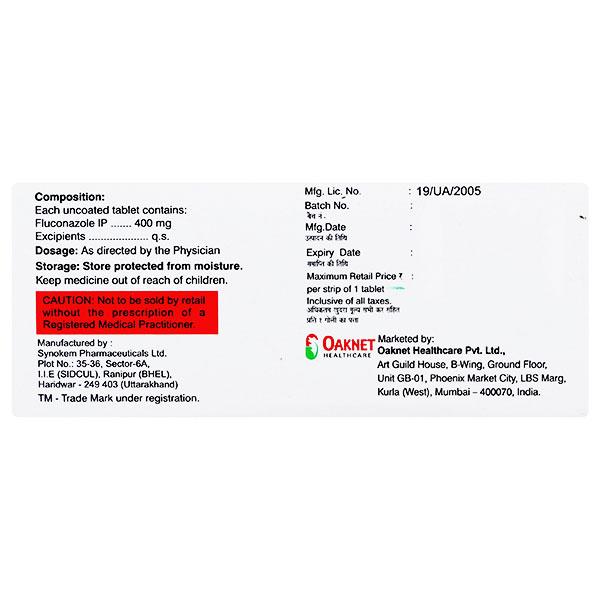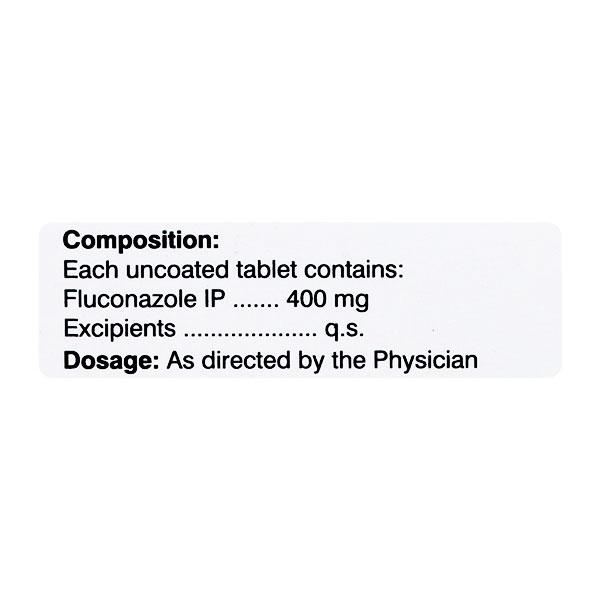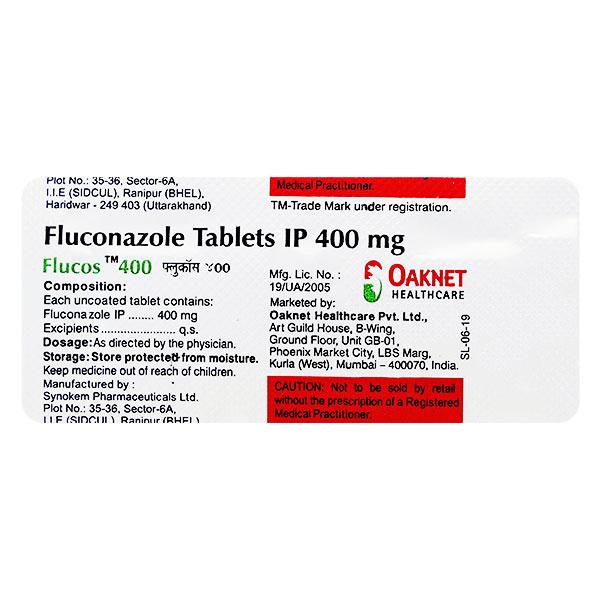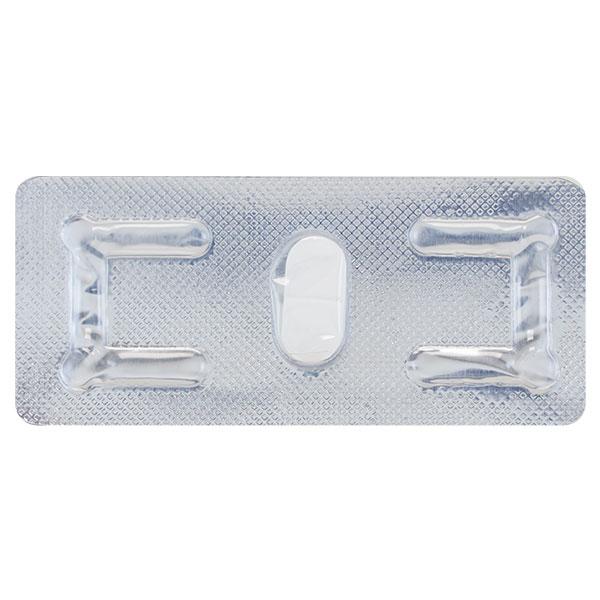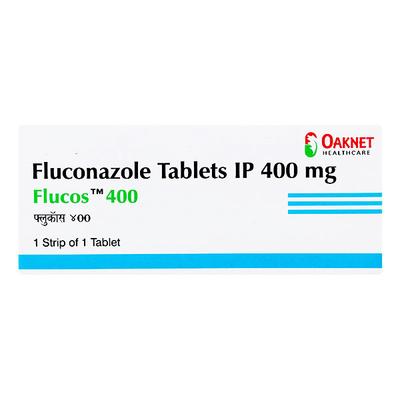

Netmeds First Membership
Quick Links
Introduction About FLUCOS 400MG TABLET
FLUCOS 400MG TABLET contains Fluconazole which belongs to the group of medicines called Anti-fungal agents. It is used to manage various fungal infections such as systemic candidiasis (fungal infection affecting the blood, brain, heart, eyes or other parts of the body), mucosal candidiasis (fungal infection affecting the mouth, throat or denture sore mouth), cryptococcosis (fungal infection mainly affecting the lungs and brain), vaginal candidiasis (fungal infection of the vagina and tissues at the opening of vagina (vulva)).
Also, it manages fungal infections in immunocompromised patients considered at risk as a consequence of HIV infection or low white blood cell count after cytotoxic chemotherapy, radiotherapy or bone marrow transplant.
Before taking FLUCOS 400MG TABLET, inform your doctor if you have liver, kidney or heart problems, abnormal levels of potassium, calcium, or magnesium in your blood, are prone to develop severe skin reactions and have a history of adrenal insufficiency.
FLUCOS 400MG TABLET is not recommended for use in pregnant and breast-feeding women unless clearly advised by the doctor. FLUCOS 400MG TABLET should be used with caution in children and adolescents (from birth to 17 years of age). It should be used with caution in elderly patients particularly with renal impairment.
The most common side effects of taking FLUCOS 400MG TABLET are headache, nausea, vomiting diarrhea, abdominal pain, and indigestion. Consult your doctor if any of the side effect gets worse.
Uses Of FLUCOS 400MG TABLET
- Manage various fungal infections (such as systemic candidiasis, mucosal candidiasis, cryptococcosis and vaginal candidiasis)
- Prevents fungal infection in immunocompromised patients
How FLUCOS 400MG TABLET Works
FLUCOS 400MG TABLET works by stopping the action of an enzyme called ergosterol, which is an integral part of the fungal cell membrane to increase its cellular permeability. Thereby, making the cell membrane more permeable and stops the fungal growth. This type of action is useful in managing and managing various fungal infections.
How to use FLUCOS 400MG TABLET
Take FLUCOS 400MG TABLET as advised by your physician. Swallow FLUCOS 400MG TABLET with a glass of water and do not chew or crush the medicine. The correct dose and duration for you will be decide by the doctor depending upon your age, body weight and type of infection.
Side Effects Of FLUCOS 400MG TABLET
Common
- headache
- nausea, vomiting
- diarrhea
- abdominal pain
- indigestion
- acne
Uncommon
- seizures, dizziness, altered nerve sensation and taste
- skin rash with itching, abnormal odor from skin and dry skin
- abnormal changes in vision
- constipation, flatulence and dry mouth
- thirst, tiredness, body pain and fever
- weakness, general feeling of discomfort, rigor
- pharyngitis, herpes simplex viral infection
- loss of appetite
- back, muscle pain, muscle spasm
- renal pain
- head spinning sensation (vertigo)
- insomnia, and nervousness
- muscle overactivity (hypertonia)
- increased urine output
- abnormal or heavy vaginal bleeding, painful menses, vaginal discharge and disorder, uterine spasm, female sexual dysfunction
- hot flushes, excess sleepiness
- deafness, increased blood pressure, low oxygen levels, intolerance to oral intake, inflamed and sore mouth (in children)
Rare
- allergic reactions
- low white blood cells and platelet count
- hair loss
- damage to liver causing liver failure, hepatitis, and necrosis
- skin reactions (like steven johnson syndrome and toxic epidermal necrolysis)
- shaking
- change in heart rate or rhythm
Stop taking FLUCOS 400MG TABLET and contact your doctor immediately if you experience any of the following side effects:
- sudden wheezing, difficulty in breathing or tightness in the chest, swelling of eyelids, face or lips, itching all over the body, reddening of the skin or itchy red spots
- skin rash that causes blistering in mouth and tongue
- signs of liver problems (tiredness, loss of appetite, vomiting and yellowing of the skin or whites of the eyes)
- signs of DRESS syndrome or drug hypersensitivity syndrome (widespread rash, high body temperature and enlarged lymph nodes)
How To Manage Side Effects
Diarrhea
Drink lot of fluids, such as water or fruit juice to keep yourself hydrated. Do not take any medicine on your own to manage diarrhea without consulting your doctor.
Dizziness Or Drowsiness
Lie down until dizziness is gone, then get up slowly. Move slowly and carefully, do not hurry. Get adequate rest. Drink plenty of water and other fluids. Avoid coffee, cigarettes, alcohol, and drugs. Consult your doctor if the symptom gets worse.
Headache
Drink ample amount of water and avoid skipping meals. Get adequate rest. Try to be relaxed and stress free. Apply pain relieving balm on your forehead if necessary. Consult your doctor if the symptom does not improve.
Nausea And Vomiting
Stick to simple meals while receiving this medicine. Avoid eating oily rich, fried or spicy foods. Do not lie down or sleep immediately after eating. Consult your doctor if the symptom does not improve.
Stomach Pain
Try to take rest and relax. Eat and drink slowly or try to have smaller and frequent meals. Keep a heat pad on your stomach. If the symptom does not improve, contact your doctor.
Warning & Precautions
Pregnancy
Monitoring requiredFLUCOS 400MG TABLET is not recommended for use during pregnancy unless considered clearly necessary. Consult your doctor before taking FLUCOS 400MG TABLET.
Breastfeeding
ContraindicatedFLUCOS 400MG TABLET is not recommended for use in breastfeeding women after repeated use or after high dose of this medicine. You may continue breast-feeding after single dose of FLUCOS 400MG TABLET. Consult your doctor before taking FLUCOS 400MG TABLET.
Driving and Using Machines
Use with CautionDo not drive or operate any machines if you experience dizziness or fits after taking FLUCOS 400MG TABLET.
Kidney
Use with CautionFLUCOS 400MG TABLET should be used with caution in patients with kidney dysfunction. Consult your doctor before taking FLUCOS 400MG TABLET.
Liver
Use with CautionFLUCOS 400MG TABLET should be used with caution in patients with liver dysfunction. Consult your doctor before taking FLUCOS 400MG TABLET.
Allergy
ContraindicatedFLUCOS 400MG TABLET is not recommended for use if you are allergic to fluconazole or other azole anti-fungals (such as itraconazole or posaconazole).
Use In Pediatrics
Use with CautionFLUCOS 400MG TABLET should be used with caution in children and adolescents (from birth to 17 years of age). Consult child’s doctor for advice before administration of FLUCOS 400MG TABLET to your child.
Use In Geriatrics
Use with CautionFLUCOS 400MG TABLET should be used with caution in elderly patients particularly with renal impairment. Your doctor may adjust the dose depending upon kidney function. Consult your doctor for advice before taking FLUCOS 400MG TABLET.
Others
FLUCOS 400MG TABLET is not recommended for use if you:
- rare hereditary problems of galactose intolerance, Lapp lactase deficiency or glucose-galactose malabsorption
Before taking FLUCOS 400MG TABLET, inform your doctor if you:
- have abnormal levels of potassium, calcium, or magnesium in your blood
- are prone to develop severe skin reactions (itching, reddening of the skin or difficulty in breathing)
- have history of adrenal insufficiency
- have no improvement in fungal infection
Interactions
A. Drug-Drug Interactions:
Before taking FLUCOS 400MG TABLET, inform your doctor, if you are taking any of the following medicines:
- medicines used to manage diabetes medicines (Ex. glyburide, tolbutamide, glipizide, chlorpropamide)
- medicines used to manage high blood pressure (Ex. hydrochlorothiazide, nifedipine, isradipine, amlodipine, felodipine and losartan)
- medicines used as blood thinners (Ex. warfarin)
- medicines used to use to manage rejection of organ transplants (Ex. cyclosporine, tacrolimus, sirolimus)
- rifampicin or rifabutin (used to manage tuberculosis)
- astemizole, terfenadine (used to manage certain type of allergies)
- medicines used to control seizures /fits (Ex. phenytoin or carbamazepine)
- theophylline (used to control asthma)
- cisapride (used to manage heartburn)
- medicines used to manage heart diseases (Ex. quinidine, amiodarone)
- medicines used to manage depression (Ex. amitriptyline, nortriptyline)
- pimozide (used to control motor or verbal tics)
- amphotericin B, voriconazole (medicine for managing various fungal infections)
- erythromycin (used for managing bacterial infections)
- cyclosphosphamide, medicines used for management of cancer (Ex. vincristine or vinblastine)
- alfentanil, fentanyl (used as general anesthetic)
- halofantrine (for managing malaria)
- medicines used to manage high cholesterol levels (Ex. atorvastatin, simvastatin, and fluvastatin)
- medicines used to manage painful conditions with inflammation (Ex. celecoxib, ibuprofen, and naproxen)
- prednisone (used to manage inflammatory disorders)
- antiviral medications used to manage HIV infection (Ex. saquinavir, zidovudine)
- tofacitinib (used to manage rheumatoid arthritis)
- ivacaftor (medicine used for managing cystic fibrosis)
- ibrutinib (used for managing blood cancer)
- midazolam, triazolam or similar medicines (used to induce sleep and manages anxiety)
- olaparib (used for managing ovarian cancer)
- methadone (used to manage chronic pain and also opioid dependance)
Overdosage:
If you or anyone else accidentally takes too much of FLUCOS 400MG TABLET, consult your doctor immediately or visit the nearby hospital. Overdosage symptoms of FLUCOS 400MG TABLET are hearing, seeing, feeling and thinking things that are not real (hallucination and paranoid behaviour).
Synopsis
| Drug | : | Fluconazole |
| Pharmacological Category | : | Triazoles |
| Therapeutic Indication | : | Prevents and manages various fungal infections |
| Dosage Forms | : | Tablet, Dispersible tablet, Capsule, Injection, Infusion, Dry syrup, Dusting powder, Gel, Cream, Ear drops, Eye drops,Soap |
More Information
- Keep FLUCOS 400MG TABLET out of reach of children
- Store at room temperature
FAQs About FLUCOS 400MG TABLET
Q: How does FLUCOS 400MG TABLET work?
A: FLUCOS 400MG TABLET works by stopping the action of an enzyme called ergosterol, which is an integral part of the fungal cell membrane to increase its cellular permeability. Thereby, making the cell membrane more permeable and stops the fungal growth. This type of action is useful in managing and managing various fungal infections.
Q: What if I forget to take a dose of FLUCOS 400MG TABLET?
A: If you have missed a dose of FLUCOS 400MG TABLET, take it as soon as you remember. However, if it is almost time for your next dose, skip the missed dose and take the next scheduled dose. Do not double the dose of FLUCOS 400MG TABLET to make up for the missed one as this may increase the chances of developing side effects.
Q: What are the common side effects of FLUCOS 400MG TABLET?
A: The common side effects of taking FLUCOS 400MG TABLET are headache, nausea, vomiting, diarrhea, abdominal pain, indigestion and acne. Consult your doctor if any of the symptom gets worse or does not improve over the time
Q: Can FLUCOS 400MG TABLET be used in elderly patients?
A: FLUCOS 400MG TABLET should be used with caution in elderly patients particularly with renal impairment. Your doctor may adjust the dose depending upon kidney function. Consult your doctor for advice before taking FLUCOS 400MG TABLET.
Q: Is FLUCOS 400MG TABLET safe to use during pregnancy?
A: FLUCOS 400MG TABLET is not recommended for use during pregnancy unless clearly advised by the doctor. Consult your doctor before taking FLUCOS 400MG TABLET if you are pregnant or planning to get pregnant.
References
1. KD. Tripathi. Section, Antifungal Drugs. Essentials of medical pharmacology. Seventh edition. 2013. Page – 787.
2. Ameish Govindarajan; Karlyle G. Bistas; Curtis J. Ingold; Ayham Aboeed. NIH National Library of Medicine, National center for biotechnology information. June 2022. [Accessed on 12th July 2022] https://www.ncbi.nlm.nih.gov/books/NBK537158
3. Josilene Chaves Ruela Corrra & Herida Regina Nunes Salgado. Review of Fluconazole Properties and Analytical Methods for Its Determination, Critical Reviews in Analytical Chemistry. May 2011. [Accessed on 12th July 2022] https://www.tandfonline.com/doi/abs/10.1080/10408347.2011.557980?journalCode=batc20
3. Viatris Ltd. Fluconazole. [Revised in March 2022] [Accessed on 12th July 2022] https://www.medsafe.govt.nz/profs/datasheet/f/fluconazolecapmylan.pdf
4. Accord Healthcare Limited. Electronic Medicines Compendium (EMC). [Revised in April 2021] [Accessed on 12th July 2022] https://www.medicines.org.uk/emc/files/pil.6086.pdf
5. FDC limited. Zocon (Fluconazole tablets) [Revised in July 2022] [Accessed on 12th July 2022] http://fdcindia.com/PackageInsert/ZoconTablets.pdf
Useful Diagnostic Tests
- Complete blood count
- Liver function test










